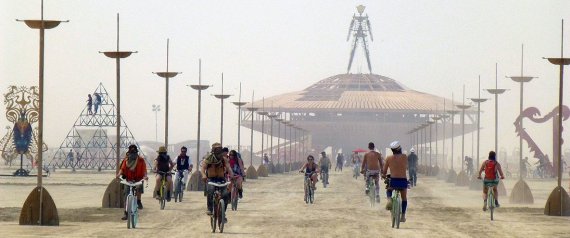Not long ago, in a desert in the American West, something happened, okay? I mean, okay?
Far from the cosseting comfort of café-crafted cappuccinos, cozy comfortable cushions, melon-scented soaps, and luxurious hotels, a crowd of more than sixty thousand first-worlders are meeting in a barren stretch of Nevada desert. It’s Burning Man, Baby, and dreams of counter-cultural cool continue to captivate and compel multitudes.
But Burning Man's current condition, alas, was as inevitable as the corruption of a hip little movie you might have seen a long time ago. Remember Star Wars? (I mean, the ORIGINAL Star Wars!) Where that smart, endlessly inventive space opera burst into the culture with the enthusiasm and innocent clarity of a young Jedi apprentice, it succumbed ultimately to a relentless commercialism that sought to cash in on the story's most obvious, superficial aspects. People wanted not just to experience the movie, they wanted to continue experiencing the movie. They wanted to be in the movie. They wanted to claim the movie’s reality as their own. The problem is that creative ideas are not usually available for ownership. That’s the reason they exist in a space beyond the commercial sphere, even if the port of entry for most of us requires a financial transaction—buying a movie ticket, say. You pay for a ticket; that’s the commercial part. You experience the movie; that’s the cultural part. Then, whatever thoughts it may provoke exist beyond the realm of commerce. They’re free for you to discuss or ruminate about in perpetuity.
I loved Star Wars growing up in the last quarter of the 20th century, and I still look back on the original trilogy with great respect and affection. But a funny thing happened on the way to Alderaan. The thing that made Star Wars shine amid a real world, Cold War malaise was the surprising clarity of it’s voice. It provoked responses from the larger culture, love it or hate it, largely because it was honest and true to its own ends. Without the ferocious commercialism that ultimately enrobed the franchise in later years, it spoke for itself.
Social stratification is a primitive Darwinian function. Many traditionalists and conservatives will claim that Darwinian expressions are inherent and unavoidable. An evolved perspective might suggest that there are alternatives, but only in societies that have figured out how to value more than relentless, grinding pursuits of purely expedient ends. Burning Man has origins in that compelling, alternative world. But the shiny, arresting, uninhibited (at Burning Man that means “naked”) light it projected captivated others who wanted to consider themselves cool enough to participate, but weren't actually cool enough to commit. I'm careful here, fully aware that I could be suggesting "things used to be good before they turned bad." It's more nuanced than that. Sadly, the disenfranchised DNA that gave birth to the early Burning Man scene was so outside the mainstream that those early creative expressions were more of a protest response than an effort to participate and foster actual change out in polo-shirted suburbia. That's only natural: the disenfranchised rarely have a voice in the mainstream, seeking change by creating new, alternative perspectives. The irony is that the new perspectives they made sounded AWFULLY APPEALING to the workaholic samurai of the modern professional world. But when those samurai wanted to go hang out with the cool kids, unwilling to realize that doing so was actually a more serious cultural business beyond counter-cultural bacchanalia, goofy music, ribald behavior and endless dirt, their results corrupted the thing they sought in the first place.
Should we be sad? Maybe. But if there's one thing the creative underclasses have always proven is that art survives, even as it abandons what came before in favor of new, bright vistas of untraveled terrain. Moneyed classes always move in to the party late, wanting to see what all the hubbub is about after the early glow has faded and the smoke grown too thick. The genuinely cool kids may be sad--even frustrated--that big money has muscled the soul out of what used to be their thing, but the genuinely cool kids also have an eternal secret. The honest-to-goodness, grab-you-by-the-shoulder interesting stuff is over here, out on the edge, just before the rest of the world discovers it. You can aspire, but if you want to be a real part of that genesis culture, you can't pretend. You have to dive in and be honest about it all the first place. Acts of honest creation cannot be easily bought.
Burning Man, like Star Wars, can still speak for itself. It can still have a unique, “real” identity for those who consciously and intentionally filter their experiences. But unless the experiential consumer can make a conscious choice to carefully filter affectations from authentic expressions, commercialism will overwhelm the ability to experience something real. I fear that Burning Man, like Star Wars and a million other mainstream, popular expressions, may have already oxidized into something other than it’s name and reputation wants you to believe you want in the first place.

